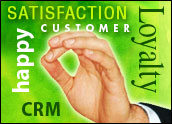
NetSuite today announced the availability of its version 10, a unique hosted solution that links the company’s proprietary CRM, enterprise resource planning (ERP) and e-commerce applications in a single Web-based architecture for small and mid-sized businesses.
The version, in development for months, includes Upsell Manager, which looks at an existing customer’s or new lead’s activity with NetSuite’s client at all touch points — through the sales force, at a brick-and-click counter or checkout, over the phone to a live call center or online — and suggests other products and services a rep should push.
The information is based specifically on the customer’s expressed interests, past purchases and “correlation maps” that show, for instance, that buyers of Acme’s Super Fantastic often use Acme’s Totally Terrific, too.
Price Points
NetSuite also offers an analytics piece for another $199 per month. NetSuite Small Business costs $49 per user per month, while NetSuite CRM runs $79 and NetSuite with Upsell Manager $99.
“We wouldn’t be able to offer everything in this system at the price points we are if we had to go out and partner with somebody” for analytics or e-commerce, according to Mini Peiris, director of product management at NetSuite.
The analytics in NetSuite Version 10 examine customer paths to purchases. Which URLs originate the most business for Acme? Which search engines send the most new buyers to Acme’s site? And which keywords are sending the search engine crawlers out to grab Acme’s name?
Drilling Down
Acme’s marketing team can drill down on each of these elements in their mix to show a return on each investment, but the sales people can drill down on the individual customer level, in real time.
“With an integrated system, there’s always a lag time. This is real-time, not a batch process at the end of the day, so our clients can respond in a much more timely manner, sometimes when people are still on their sites,” Peiris told CRM Buyer.
The analytics, she said, enable NetSuite clients — companies with five to 500 employees — to start customer relationships personally.












































